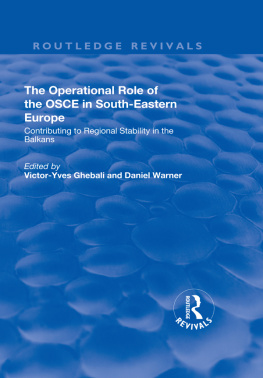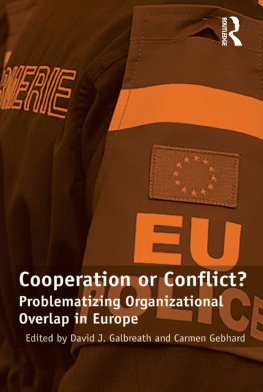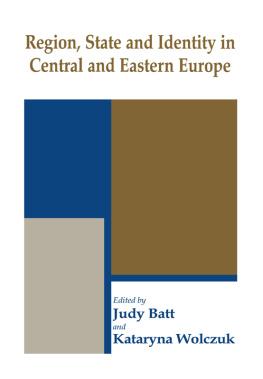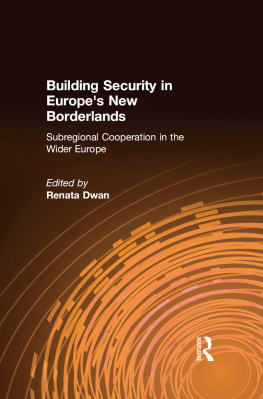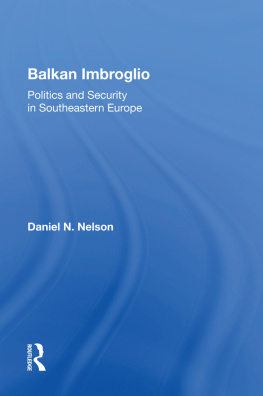The Operational Role of the OSCE in South-Eastern Europe
First published 2001 by Ashgate Publishing
Reissued 2018 by Routledge
2 Park Square, Milton Park, Abingdon, Oxon OX14 4RN
711 Third Avenue, New York, NY 10017, USA
Routledge is an imprint of the Taylor & Francis Group, an informa business
Copyright Victor-Yves Ghebali and Daniel Warner 2001
All rights reserved. No part of this book may be reprinted or reproduced or utilised in any form or by any electronic, mechanical, or other means, now known or hereafter invented, including photocopying and recording, or in any information storage or retrieval system, without permission in writing from the publishers.
Notice:
Product or corporate names may be trademarks or registered trademarks, and are used only for identification and explanation without intent to infringe.
Publishers Note
The publisher has gone to great lengths to ensure the quality of this reprint but points out that some imperfections in the original copies may be apparent.
Disclaimer
The publisher has made every effort to trace copyright holders and welcomes correspondence from those they have been unable to contact.
A Library of Congress record exists under LC control number: 00111837
ISBN 13: 978-1-138-72789-2 (hbk)
ISBN 13: 978-1-315-19070-9 (ebk)
Contents
Joseph Deiss
Einar Bull
Marianne von Grnigen
Margrit Wstfelt
Willy Hanset
Bernard Poncet
Robert L. Barry
Marianne Ducasse-Rogier
Geert-Hinrich Ahrens
Dan Everts
Carlo Ungaro
Emeric Rogier
Victor-Yves Ghebali
Eric Remacle
Victor-Yves Ghebali
Erik Pierre
Louis Michel
Robert L. Barry
Guide
Geert-Hinrich Ahrens
Ambassador, Head of the OSCE Presence in Albania
Robert L. Barry
Ambassador, Head of the OSCE Mission to Bosnia and Herzegovina, Special Envoy of the Chairman-in-Office of the OSCE 1999
Einar Bull
Ambassador, Representative of the Chairman-in-Office of the OSCE, Norwegian Chairmanship 1999, Norwegian Royal Ministry of Foreign Affairs
Joseph Deiss
Federal Councillor, Federal Department of Foreign Affairs of the Swiss Confederation
Dan Everts
Ambassador, Head of the OSCE Mission to Kosovo
Victor-Yves Ghebali
Professor, The Graduate Institute of International Studies (Geneva)
Willy Hanset
Lieutenant-General, Former Commander of the Military Component of UNTAES, Head of Operational Command Ground Force, Belgian Armed Forces
Louis Michel
Vice Prime Minister and Foreign Affairs Minister, Kingdom of Belgium
Erik Pierre
Ambassador, Former Ambassador of Sweden to Sarajevo, Brussels
Bernard Poncet
Ambassador, Head of the OSCE Mission to Croatia
Eric Remacle
Professor, Universite Libre de Bruxelles
Emeric Rogier
PhD student, Graduate Institute of International Studies (Geneva)
Marianne Ducasse-Rogier
PhD student, Graduate Institute of International Studies (Geneva)
Carlo Ungaro
Ambassador, Head of the OSCE Spillover Monitor Mission to Skopje
Marianne von Grnigen
Ambassador, Head of Swiss Delegation to the OSCE
Margrit Wstfelt
First Deputy Head of Mission of Austria to the OSCE
Joseph Deiss
The Conference on The Operational Role of the OSCE in South-Eastern Europe: Contributing to Regional Stability in the Balkans addressed one of the most urgent problems in Europe today. During the 1990s, a series of serious conflicts broke out that devastated the region. The commitment of the international community to stabilising South-Eastern Europe is considerable. We are confronted with the challenge of establishing democracy, the rule of law and respect for human rights, in particular the rights of minorities.
The OSCE is making a major contribution to this effort. In the countries of the region, its Missions promote stability by helping government authorities implement and then stick to their obligations. In Brussels, this conference brought OSCE field experience and academic expertise together and facilitated a fruitful exchange of experiences and analyses.
Success in this common endeavour is far from sure. The conference was right to draw our attention to the historical dimension of the issues at stake and to point out how difficult it is to open up established authoritarian power structures to democratic forces. Elections are only an appropriate means in situations where a basic and functioning framework respecting the rule of law has been established.
The situation remains worryingly uncertain in a number of States in the region. The failure of the Belgrade government to lead the country away from the totalitarian structures of the past and towards democracy and solid co-operation with its partners both in and outside the region has undermined the stability of South-Eastern Europe. Respect for minorities - in particular in the context of Kosovo - is one of the keys to peace and security. We must continue to watch events closely and to ensure that the international community gives clear and coherent signals.
The Stability Pact for South-Eastern Europe, which has been placed under the auspices of the OSCE, is the forum for the efficient determination and coordination of bilateral and multilateral measures. It focuses international support on pushing through political and economic reforms in the region, in combination with the establishment of reliable structures in the countries concerned. We must follow up a successful start with projects in order to consolidate and build on the transformations that have been started.
We will only achieve our objectives in South-Eastern Europe if the countries concerned, their government authorities and local civil society acquire full ownership of the transformation processes. A paternalistic approach imposed from outside would be out of place. In our efforts, we have to assist the countries of the region to implement the commitments they themselves have entered into. Help should only be given when and for as long as needed, and we should envisage handing over responsibilities to local players right from the start.
I would like to thank the conference organisers most sincerely for their initiative and commitment. This meeting was the successful result of co-operation between several partners. It has been made possible thanks to the material support of the Belgian authorities and that of the Swiss Federal Department of Defence, Civil Protection and Sport as part of its Partnership for Peace programme. Experts from different areas were gathered together, and their deliberations will make an important contribution to meeting the serious challenges facing Europe today.
Einar Bull
The OSCE Istanbul Summit has just been concluded. The underlying purpose of this meeting was to continue the adaptation of the OSCE to new challenges, to emphasise its primary role in European crisis management, and to strengthen cooperation with other security organisations. The decision to establish Rapid Expert Assistance and Co-operation Teams, REACT, will greatly enhance the ability of the OSCE to respond quickly to demands for assistance and to implement large civilian field operations, as will the establishment of an Operations Centre within the OSCE secretariat. With the Istanbul decisions the OSCE is even better placed to contribute to answering the demand for integrated crisis management involving civilian as well as military components.

